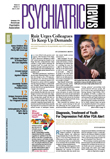Abipartisan group of Senate leaders has introduced a bill to require mental health parity coverage for beneficiaries in every State Children's Health Insurance Program (SCHIP).
The measure, titled the Children's Mental Health Parity Act (S 1337), was introduced May 8 and would prohibit states from setting limits on coverage of mental health or substance abuse services that are lower than those set for other health care services for children.
Supporters of the bill, including APA and the American Academy of Child and Adolescent Psychiatry (AACAP), and bill sponsors Sen. John Kerry (D-Mass.) and Sen. Gordon Smith (R-Ore.) hope that the bill can be included as part of the SCHIP reauthorization set for Senate consideration this summer.
“You want to minimize trauma to kids as much as you can, and if they are already enrolled in SCHIP, then let's get them care through that program instead of the parents' having to give up custody to the state or take some other desperate approach to get care for them,” said Lizbet Boroughs, deputy director of APA's Department of Government Relations.
SCHIP, which was enacted in August 1997, gave states new incentives to extend public health insurance coverage to low-income, uninsured children. Among the incentives are a higher federal match and greater flexibility to design their programs than allowed under Medicaid.
For many years, APA and other mental health advocates have been organizing legislative support to add a mental health parity requirement to SCHIP, but consideration of such a mandate was delayed until Congress was set to reauthorize SCHIP 10 years after it was launched.
In addition to prohibiting discriminatory limits on mental health care in SCHIP plans, the bill would eliminate a provision that allows states to lower the amount of mental health coverage to 75 percent of the coverage given in benchmark plans that states can use as models.
“As Congress begins to work on reauthorizing SCHIP, arbitrary and harmful limits on mental health care must be prohibited in this vital program,” said David Shern, Ph.D., president and CEO of Mental Health America.
Parity in SCHIP is needed because mental illness affects about 1 in 5 U.S. children, and serious behavioral health problems impact the functioning of up to 9 percent of youngsters. Among low-income children, whose care SCHIP is designed to cover, the rates of mental health problems are even higher, according to advocates of the bill. About two-thirds of children with mental illness receive no treatment for their disorder. Under SCHIP, only about 40 percent of states offer full coverage of necessary services for children with complex mental health needs.
“Without early and effective intervention, affected children are less likely to do well in school and more likely to have compromised employment and earnings opportunities,” Kerry said on the Senate floor.“ Moreover, untreated mental illness may also increase a child's risk of coming into contact with the juvenile-justice system, and children with mental disorders are at a much higher risk for suicide.”
“Mental health is integral to the health and well-being of all children,” Thomas Anders, M.D., president of AACAP, wrote in a letter to senators. “Children coping with emotional and mental disorders must be identified, diagnosed, and treated to avoid the loss of critical developmental years that can never be recaptured.”
The expansion of mental health care under SCHIP appears to be a popular idea in Congress, and several other bills also propose expanded coverage.
In late April, Sens. John Rockefeller (D-W. Va.) and Olympia Snowe (R-Maine) introduced a bill (S 1224), for example, that would reauthorize and expand SCHIP to cover 6 million additional children over the next 10 years and expand coverage of mental health and dental care.
The All Healthy Children Act (HR 1688), introduced by Rep. Bobby Scott (D-Va.) in March, would consolidate Medicaid and SCHIP into a single program with comprehensive mental health benefits.
The texts of S 1337, S 1224, and HR 1688 can be accessed online at<http://thomas.loc.gov> by searching on the respective bill number. ▪
